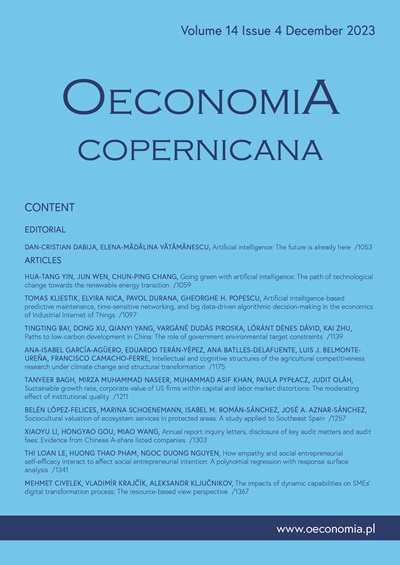规避风险的投资者应该把对社会负责的公司作为投资目标吗?
IF 10.8
1区 经济学
Q1 ECONOMICS
引用次数: 12
摘要
研究背景:企业必须实施企业社会责任政策,以减轻其活动对社会和环境的不利影响,并在社会眼中获得合法性。可持续发展举措对公司来说成本高昂,但同时也是重要的价值创造驱动因素。零售和机构投资者越来越多地根据企业社会责任表现来选择投资组合。然而,文献中几乎没有研究企业社会责任和市场贝塔之间的关系,也没有对美国和欧洲市场进行直接比较。文章的目的:定义投资的两个基本变量是回报和风险,适当的风险回报组合取决于投资者的情况。本研究旨在分析企业社会责任与市场风险之间的关系,市场风险被理解为价格波动,并通过美国和欧洲市场的市场贝塔系数来衡量。方法:使用工具变量(IV)和固定效应面板数据的OLS回归检验2015年至2019年标准普尔500指数和欧洲斯托克300指数中上市的公司。研究结果和附加值:研究结果表明,那些企业社会责任较高的公司的贝塔系数低于美国市场的市场指数,波动性较低,因此更适合规避风险的投资者。然而,这种关系并未在欧洲市场得到证实。这种差异可能有两个原因:1)美国不遵守《京都议定书》,导致法律法规不如欧洲严格;2) 在美国市场,贝塔更具攻击性,而在欧洲市场,贝塔则更具防御性,几乎没有降价空间。这项研究提供了经验证据,证明社会、环境和公司治理的可持续性做法减少了美国资本市场的股票波动,这与基于道德标准进行投资的私人和机构投资者高度相关,从而有助于了解当前的知识状况。这些结果是最新和可靠的,因为它们涵盖了两个最重要的股市指数的广泛和近期。本文章由计算机程序翻译,如有差异,请以英文原文为准。
Should risk-averse investors target the portfolios of socially responsible companies?
Research background: Companies are required to implement Corporate Social Responsibility (CSR) policies to mitigate the adverse social and environmental effects of their activities and gain legitimacy in the eyes of society. Sustainability initiatives are costly for companies but, at the same time, they are important value-creation drivers. Retail and institutional investors are increasingly choosing portfolios based on CSR performance. However, the relationship between CSR and market beta has hardly been studied at all in the literature, and no direct comparison of the U.S. and European markets has been conducted.
Purpose of the article: The two fundamental variables that define an investment are return and risk, and the appropriate risk-return combination depends on the profile of the investors. This research aims to analyze the relationship between CSR and market risk, understood as price volatility and measured by market beta in the U.S. and European markets.
Methods: Companies listed in the S&P 500 and Euro Stoxx 300 indexes from 2015 to 2019 were examined using OLS regressions with instrumental variables (IV) and fixed effects panel data.
Findings & value added: The results show that those companies with higher CSR have betas below the market index in the U.S. market as well as lower volatility, and are, therefore, more appropriate choices for risk-averse investors. However, this relationship was not confirmed in the European market. This difference may be justified by two reasons: 1) The non-adherence of the United States to the Kyoto Protocol, resulting in less strict legal regulations than in Europe; 2) In the U.S. market, betas are more aggressive, while in the European market they are more defensive, with little margin for reduction. This research contributes to the current state of knowledge by providing empirical evidence that social, environmental, and corporate governance sustainability practices reduce stock volatility in the U.S. capital market, which is highly relevant for private and institutional investors who make their investments based on moral criteria. The results are current and reliable since they cover a broad and recent period for two of the most important stock market indexes.
求助全文
通过发布文献求助,成功后即可免费获取论文全文。
去求助
来源期刊

Oeconomia Copernicana
ECONOMICS-
CiteScore
13.70
自引率
5.90%
发文量
26
审稿时长
24 weeks
期刊介绍:
The Oeconomia Copernicana is an academic quarterly journal aimed at academicians, economic policymakers, and students studying finance, accounting, management, and economics. It publishes academic articles on contemporary issues in economics, finance, banking, accounting, and management from various research perspectives. The journal's mission is to publish advanced theoretical and empirical research that contributes to the development of these disciplines and has practical relevance. The journal encourages the use of various research methods, including falsification of conventional understanding, theory building through inductive or qualitative research, first empirical testing of theories, meta-analysis with theoretical implications, constructive replication, and a combination of qualitative, quantitative, field, laboratory, and meta-analytic approaches. While the journal prioritizes comprehensive manuscripts that include methodological-based theoretical and empirical research with implications for policymaking, it also welcomes submissions focused solely on theory or methodology.
 求助内容:
求助内容: 应助结果提醒方式:
应助结果提醒方式:


